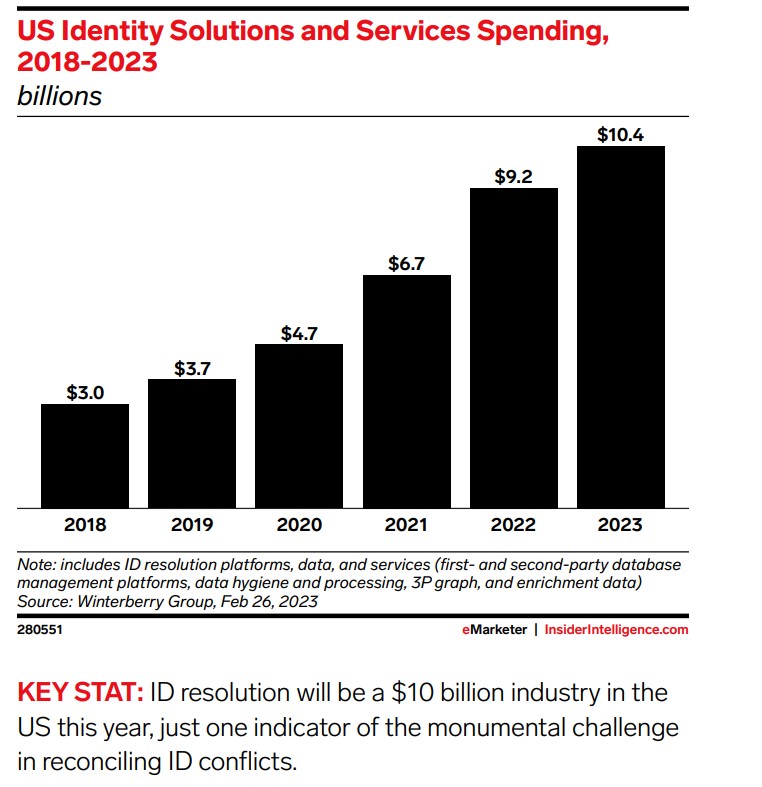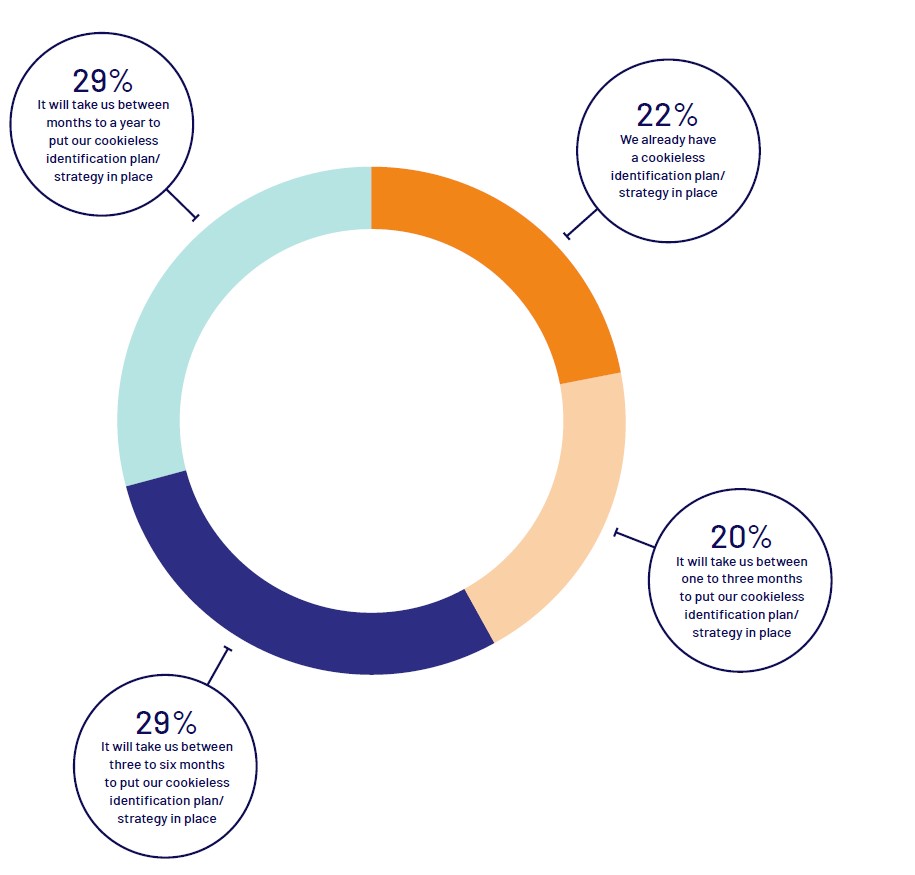
What is ID Resolution?
Halal advertising must get serious about ID Resolution or get left behind. But, what is ID Resolution? If you have been paying attention to the impending demise of the third-party cookie, you will know that ID Resolution is a big part of this issue.
MarTech defines and explains the importance of ID Resolution in a nutshell:
“Identity resolution – the science of connecting the growing volume of consumer identifiers to one individual as he or she interacts across channels and devices – has become critical to marketing success, as well as essential for compliance with consumer privacy laws such as the California Consumer Privacy Act (CCPA) and the European Union’s General Data Protection Regulation (GDPR).”
Identity resolution is all about getting a sneak peek into someone’s online activities and interests, from different devices. For instance, if you collect information from their laptop, phone, email, and TV, and combine it together, you can get a pretty good idea about what they’re into. However, this information is anonymous so you can’t find out exactly who the person is, like their name or address. At best, you can find out their age, gender, location, and what they like to do online and buy.
Identity: At its simplest, identity refers to identifying a person online. This is super useful for advertisers because they can then target the right people who are interested in their products or services, with the perfect message at the perfect time
Resolution: So, what Resolution means is that all the information about a person is collected and put together into a single profile. For instance, someone might use one browser for work and another for personal shopping. Or their phone and tablet might reveal more about what they enjoy doing in their free time, sports they like watching, or things they search for during a lazy Sunday afternoon.
Looking at only one of these devices by itself doesn’t give you the full picture. But when you combine them all, you get a much better idea of who this person is across different screens and gadgets. This helps target, personalize, and measure marketing campaigns for specific individuals.
The Impending Doom for Halal Advertising?
“So, what’s the problem?” you may ask. The problem is stated and addressed in a recent ad industry report by eMarketer: “ID Resolution H1 2023” which states:
“ID resolution — identifying individual users across digital touchpoints — is critical for marketing success. But the deprecation of legacy identifiers will continue, and the ad industry needs to adopt post-cookie solutions now before its hand is forced.”
It’s quite interesting how Muslim and mainstream brands started panicking when the death of the third-party cookie was announced some time back. Then, when this was postponed till 2024 many of those same brands went around doing their business as usual and forgot all about it.
Now, however, we see that many of the bigger brands have been preparing for the end of the third-party cookie quite a bit. This is reflected in the same report that shows that:
“Spending on US identity solutions has been steadily growing over the last five years. Expenditures will reach $10.4 billion by the end of 2023—a 13% increase over 2022 and nearly triple the 2018 total,…”.

Image source: ID Resolution H1 2023
The report also shares the extent to which marketers are taking the third-party cookie and ID phase-out seriously. “How seriously”? you may ask and the answer is “deadly serious”.
As per the ID5 State of Digital Identity 2022 report, almost half of the marketers and publishers indicated that they would implement a cookie-free strategy by the end of 2022. Additionally, 29% reported that they would be prepared by mid-2023, while the remaining 22% had already laid out their plans for the same.

Image source: ID5 State of Digital Identity 2022 report
According to the eighth edition of Salesforce’s State of Marketing report, nearly 90% of marketers who utilized AI in 2022 did so to address customer identity concerns. This marks a 22% increase from the previous year and is the largest jump observed in the study for AI-related activities.
As you can see, the marketing and advertising world for the most part is rapidly shifting towards ID solutions in a world with no third-party cookies and an extremely consumer-privacy-friendly world.
What steps have you taken for your halal business’ marketing and advertising in the new world that is less than seven months away, at the time of writing this article?
Key to Succeeding With Your Halal Advertising in the Post-Cookie World
For a successful shift in the right direction, you need a proper internal audit of how you collect consumer data and how you use it. However, we can take a look at a few things you must keep in mind after you have done an internal audit and are preparing your post-third-party-cookie advertising strategy.
Zero, First-Party, and Second-Party Data
Where petrol is the black gold, zero and first-party data can be considered to be digital Rhodium (the most valuable metal on earth and exists within the platinum group of metals) in the world of advertising.
Zero-party data is data that consumers intentionally and proactively share with your halal brand. On the other hand, first-party data is data that you collect through interactions with Muslim customers, such as purchase history or website behavior.
We can’t emphasize the importance of zero-party data enough, particularly for Muslim brands, as it allows for a deeper understanding of Muslim customers and provides an opportunity for personalization. With privacy laws evolving and consumers becoming more cautious with their personal information, collecting zero-party data can also help build trust between the brand and their audience.
Your Muslim brand can collect zero-party data through quizzes, surveys, and other interactive content that provide value to your audience. By doing so, you can create a more personalized experience for halal industry customers while respecting their privacy.
Second-party data is a brand’s first-party data that is sold to another brand for targeting specific customers. It’s high quality and specialized but only available through a private partnership and smaller in scope than third-party data. By establishing a strategic data partnership, Muslim brands can access more niche data for targeted advertising, like using Muslim halal dining data for a halal restaurant-specific discount card.
Data Clean Rooms (DCRs)
What are data clean rooms and how will they help your halal advertising in the post-cookie world?
We found that the best and easiest explanation of what a data clean room is has been provided by TechTarget and so we summarized it below:
“A data clean room is a technology service that helps content platforms keep first-person user data private when interacting with advertising providers. It is intended to keep user data isolated and private.”
- When content platforms interact with advertising providers, DCRs keep user data private.
- It is the data equivalent of a real-world clean room, with the aim of creating a flawless environment in which technology cannot be polluted by outside influences.
- DCRs collect aggregated and anonymized user data to safeguard the privacy of users while offering advertisers non-personally identifiable information (non-PII) to target a specific demographic and measure audience size.
- Privacy restrictions, as well as advertisers’ ongoing desire to more accurately reach consumers, have fueled an increasing need for data clean rooms.
Although just twenty percent of marketers in North America had DCRs in Q2 2022, according to a survey by the CMO Council of over 160 marketing leaders, 24% are planning to get one.
Keep in mind that DCRs can be very expensive and that many are compatible only with a specific platform.
- Walled garden DCRs are restricted platforms used by major companies for first-party data set enrichment.
- Neutral DCR vendors provide software solutions designed for media companies and brands. They provide adaptability, partnership, and a more unified view, as well as being easier to use.
- Owned DCRs provide versatility and governance controls, however, they are technical solutions with limited access to partner data outside their ecosystem.
If you like the idea of using a DCR make sure you read our article on CDPs (customer data platforms) as the two work extremely well together.

Image source: Data Clean Rooms and CDPS: How to Empower Your First-Party Data Strategy
Muslim Ad Network (MAN)
As the Muslim population continues to grow around the world, and privacy restrictions make serving ads to the already hard-to-get-to Muslim consumers even more complicated, it may be time for you to work with Muslim Ad Network.
Muslim Ad Network is a niche advertising platform aimed at Muslim consumers. It provides a variety of ad formats, including display ads, video ads, and native ads, all of which can be tailored to your brand’s specific requirements. You can target your ads with the Muslim Ad Network based on factors such as location, interests, and demographics, ensuring that your message reaches the right people.
A platform that understands Muslim consumers
Muslim Ad Network is designed specifically to serve the needs of Muslim consumers. Its team of experts understands the unique cultural, social, and religious factors that influence Muslim consumer behavior. By partnering with the Muslim Ad Network, you can leverage this expertise to develop advertising campaigns that resonate with Muslim consumers. A partner with over a decade of experience serving ads to Muslim consumers online.
Leave the worrying to us
Although in this article we tried to give you as much information as possible about the very near future of advertising and its complications, there is still plenty more that we could not cover. This means that advertising complications will create many frustrations for brands and marketers who are not prepared. Even for those preparing, some of the solutions mentioned are quite expensive without even customizing them to serve ads to a complicated niche like the Muslim consumer market.
Muslim Ad Network is an excellent platform for brands looking to connect with Muslim consumers. MAN’s targeted advertising capabilities, deep understanding of Muslim consumers, and high-quality ad formats make it an ideal choice for your mainstream or Muslim brand looking to reach this growing and influential market at a time of privacy and advertising restrictions.
Contact MAN today to learn more about how we can help you reach Muslim consumers in a new world of advertising.
